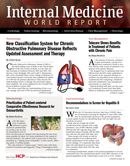Publication
Article
Internal Medicine World Report
US Residents of Indian Origin Have Elevated Risk of Inflammatory Bowel Disease
Author(s):
Patients of Indian ancestry living in the United States are at greater risk for all types of inflammatory bowel disease (IBD) than other American populations, according to a new study by Reenu Malhotra, MD, and colleagues published online in Clinical Gastroenterology and Hepatology on July 29, 2014.

Patients of Indian ancestry living in the United States are at greater risk for all types of inflammatory bowel disease (IBD) than other American populations, according to a new study by Reenu Malhotra, MD, and colleagues published online in Clinical Gastroenterology and Hepatology on July 29, 2014. East Asians and Hispanics have a lower risk, possibly similar to that of the populations still living in their original countries.
The investigators used a national pathology database to collect data on over 1 million subjects around the nation who underwent colonoscopies with ileocolonic biopsies from January 2008 through December 2013. One group of 35 histopathologists reported evaluations of mucosal biopsy specimens.
Ancestries stratified for the study were Indian (ancestry in the subcontinent of India), East Asian (China, Korea, Japan, and Vietnam), Hispanic, Jewish, and Other. The researchers determined the prevalence of ulcerative colitis (UC), Crohn’s disease (CD), and indeterminate colitis for each ethnic group.
A total of 30,812 patients were diagnosed with IBD (20,308 with UC, 7,706 with DC, and 2798 with indeterminate colitis). UC was more commonly associated with Indian and Jewish ethnicity and less commonly associated with East Asian and Hispanic ethnicity. Similar patterns also applied to CD and to all types of IBD analyzed together.
Among Indians, 11.7% of those with Gujarati origins had IBD compared with 7.9% of other Indians (odds ratio, 1.5; 95% Confidence Interval, and 1.14-2.11).





